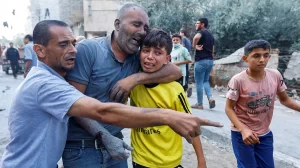Intense bombardments strike in Gaza as mediators try to unlock aid
প্রকাশিত হয়েছে : ১২:৪১:৪৪,অপরাহ্ন ১৮ অক্টোবর ২০২৩ | সংবাদটি ১৬৫২ বার পঠিত
 By Tanvir Shahjahan: Israel bombed areas of southern Gaza where it had told Palestinians to flee to ahead of an expected ground invasion, killing dozens of people on Tuesday in attacks it says are targeted at Hamas resistance group that rule the besieged territory.
By Tanvir Shahjahan: Israel bombed areas of southern Gaza where it had told Palestinians to flee to ahead of an expected ground invasion, killing dozens of people on Tuesday in attacks it says are targeted at Hamas resistance group that rule the besieged territory.
With no water, fuel or food being delivered to Gaza since Hamas’ military operation on Israel last week, mediators struggled to break a deadlock over delivering supplies to increasingly desperate civilians, aid groups and hospitals.
US President Joe Biden travels to Israel and Jordan to meet with both Israeli and Arab leadership on Wednesday, as concerns increase that the raging Israel-Hamas war could expand into a larger regional conflict.
Violence flared on Tuesday along Israel’s border with Lebanon, where Iranian-backed Hezbollah operate.
In Gaza, dozens of injured were rushed to hospitals after heavy attacks outside the southern cities of Rafah and Khan Younis, residents reported.
Basem Naim, a senior Hamas official and former health minister, reported 27 people were killed in Rafah and 30 in Khan Younis.
An Associated Press reporter saw around 50 bodies brought to Nasser Hospital in Khan Younis. Family members came to claim the bodies, wrapped in white bedsheets, some soaked in blood.
An airstrike in Deir al Balah reduced a house to rubble, killing nine members of the family living there. Three members of another family that had evacuated from Gaza City were killed in a neighboring home. The dead included one man and 11 women and children. Witnesses said there was no warning before the strike.
The UN human rights office decried “appalling reports” that civilians who were trying to flee to southern Gaza were killed by a military strike.
Spokeswoman Ravina Shamdasani urged Israeli forces to avoid “aerial bombardments, indiscriminate or disproportionate attacks” and to “take precautions to avoid – and in any case, to minimize – loss of civilian life, injury to civilians and damage to civilian objects.”
Israeli strikes on Gaza have killed at least 2,778 people and wounded 9,700, according to the Gaza Health Ministry. Nearly two-thirds of those killed were children, a ministry official said. Another 1,200 people across Gaza are believed to be buried under the rubble, alive or dead, health authorities said.
Emergency teams struggled to rescue people while cut off from the internet and mobile networks, running out of fuel and exposed to unceasing airstrikes.
Israeli Prime Minister Benjamin Netanyahu said yesterday that his country’s retaliation against Hamas aims to eradicate the group’s political and military rule over Gaza.
Israel has massed troops at the border for an expected ground offensive, but Hecht said Tuesday no concrete decisions have been made despite Israel’s mass evacuation order for the north of the Gaza Strip.
More than 1 million Palestinians have fled their homes — roughly half of Gaza’s population — and 60% are now in the approximately 14-km long area south of the evacuation zone, the UN said.
Aid workers warned that the territory was near complete collapse. Hospitals were on the verge of losing electricity, threatening the lives of thousands of patients, and hundreds of thousands of people searched for bread and water.
The UN agency for Palestinians said more than 400,000 displaced people are crowded into schools and other facilities in the south. The agency said it has only 1 liter of water a day for each of its staff members trapped in the territory.
Israel opened a water line into the south for three hours that benefitted only 14% of Gaza’s population, the UN said.
At the Rafah crossing, Gaza’s only connection to Egypt, truckloads of aid were waiting to enter. The World Food Program said that it had more than 300 tons of food waiting to cross into Gaza.
Civilians with foreign citizenship — many of them Palestinians with dual nationalities — also waited in Rafah, desperate to get out.
“We come to the border crossing hoping that it will open, but so far there is no information,” said Jameel Abdullah, a Swedish citizen.
An agreement to open the border appeared to have been reached Monday, but Israel denied reports of a cease-fire in Rafah, which would be a precondition.
An Egyptian official said yesterday that Egypt and Israel agreed that the aid convoys at the border would travel into Israel for inspection at the Kerem Shalom crossing between Gaza and Israel.
US Secretary of State Antony Blinken, who visited Israel for the second time in a week on Monday after a six-country tour through Arab nations, said in Tel Aviv that the US and Israel had agreed to develop a plan to enable humanitarian aid to reach civilians in Gaza.
There were few details, but the plan would include “the possibility of creating areas to help keep civilians out of harm’s way.”
Iran’s Supreme Leader Ayatollah Ali Khamenei warned that Israel’s continuing offensive in Gaza could cause a violent reaction across the region.
“Bombardments should be immediately stopped. Muslim nations are angry,” Khamenei said, according to state media.




